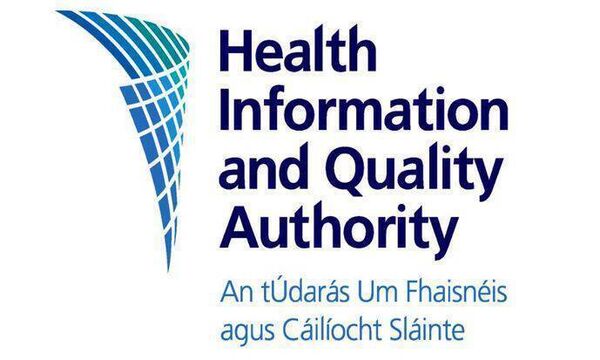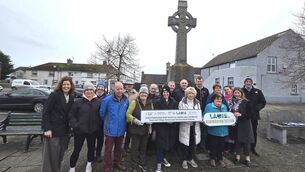Refugee accommodation centre in Laois gets glowing report

Photo: Dídean International Protection Accommodation Service
THE Dídean International Protection Accommodation Service Centre in Portlaoise got a glowing report from the Health Information and Quality Authority (HIQA) following an inspection of its services over a two-day period last September.
In 27 of the 28 areas HIQA inspectors found the centre, staff, accommodation and services were ‘substantially compliant’ ‘compliant’ with the national standards with the remaining area ‘partially complaint’.
The inspections were carried out on Wednesday and Thursday 25 and 26 September.
Dídean Portlaoise is an accommodation centre comprising nine own-door apartments and houses. The houses are situated in a housing estate and the apartments within an apartment block located nearby. At the time of the inspection 42 residents were living in the centre which included 19 adults and 23 children. All residents live with their family members and of the nine family units, six units were shared between families.
The accommodation, across nine properties, which included seven houses and two apartments, provided facilitates residents to live independently, with each unit having a kitchen and dining room, a living area, bathrooms, and sufficient space for storage of personal items.
Families who share accommodation with other families have their own bedrooms and bathrooms and share a kitchen and living space. The centre, which is located on the outskirts of the town, is in close proximity to local schools, crèches, pre-schools, shops, transport links, health and social services.
The centre is managed by a social care leader who reports to the chief operations officer of the company. There is a deputy social care leader and a team of social care workers and assistant support workers also employed in the centre. The staff and management team work from an office in the centre of the town.
During the time of the inspections, the inspectors spoke with 13 adults and 10 children living in the centre. In addition, the inspectors spoke with the chief financial officer, the chief operations officer, and the social care leader, who was the manager of the centre. The inspectors also spoke with the administration manager, the designated liaison person, and members of the staff team including social care workers and assistant support workers.
Of the 16 families, 13 shared their accommodation with other families. Five of the houses accommodated two families and one house had three families who shared with each other. The apartments and houses had their own bathrooms, kitchen facilities and living areas. The family units were located within the local community and residents could access the main office by local bus transport. The inspection found that the accommodation provided to residents was maintained to a high standard and had sufficient equipment and facilities for residents to live their daily lives, cook and complete their own laundry.

The houses were spacious with ample space for children to play, and develop. There was adequate storage for residents to store their clothes and belongings without impacting on their living environment.
Residents told the inspectors that they were very happy with the standard of accommodation but some reported that they were not permitted to personalise their accommodation with photographs or their children’s art work.
The inspectors observed that while the houses were very clean and well-maintained, accessories and decor were limited. Visitors were welcomed to the centre and residents’ right to privacy was promoted, as guests met with their family and friends in their own accommodation.
The inspection found it was evident that residents benefited from professional support. Despite this, some residents told the inspectors that they found the level of interaction from staff to be overwhelming at times.
The staff team developed outcomes with the residents on a monthly basis to support their integration or to focus the resident on a particular area of interest. While their staff team were well-intended, the inspectors found that this had the potential to place additional pressure on residents and potentially impact on their autonomy in relation to day-to-day life.
Residents were provided with essential non-food items on arrival to the centre, such as bedding and towels as well as basic food items. The staff team had access to translation services when required. The inspectors found that residents were regularly consulted with about their views on the service and that their feedback influenced change. Residents told the inspectors that they felt safe living in the centre. They said that they could talk to staff if they had concerns, and they generally felt heard by staff.
Residents spoke fondly of the staff team and said they were kind and treated them with respect. One resident described staff as “wonderful” and “super” and said “staff go the extra mile to discharge their duties”.
Some residents said the visits from staff were too frequent but all residents said they were well supported by the team. They were happy with their accommodation, particularly as they could cook for themselves and complete their own laundry. Some residents said they would like access to a tumble dryer and another complained that the temperature of the water was not hot enough, however, overall residents said maintenance issues were managed without delay and they were content with their accommodation.
In summary, the HIQA said that “residents were safe and protected living in this centre and they had access to supports from a competent and skilled staff and management team. The accommodation provided met the needs of the residents and allowed them to live independent lives. There were many examples of good practice in relation to the promotion of human rights, however, resident’s views and needs, particularly in the areas of to the model of support offered and some practices in the centre, needed further consideration.”
The one area that HIQA scored low on was the role of the reception officer.
HIQA felt this role must be designated as a dedicated resource within the organisation and that Dídean “will allocate one specific staff member to fulfil this role, always ensuring consistent oversight and assistance.” The full report can be viewed by logging onto www.hiqa.ie/areas-we-work/find-a-centre/didean-portlaoise




